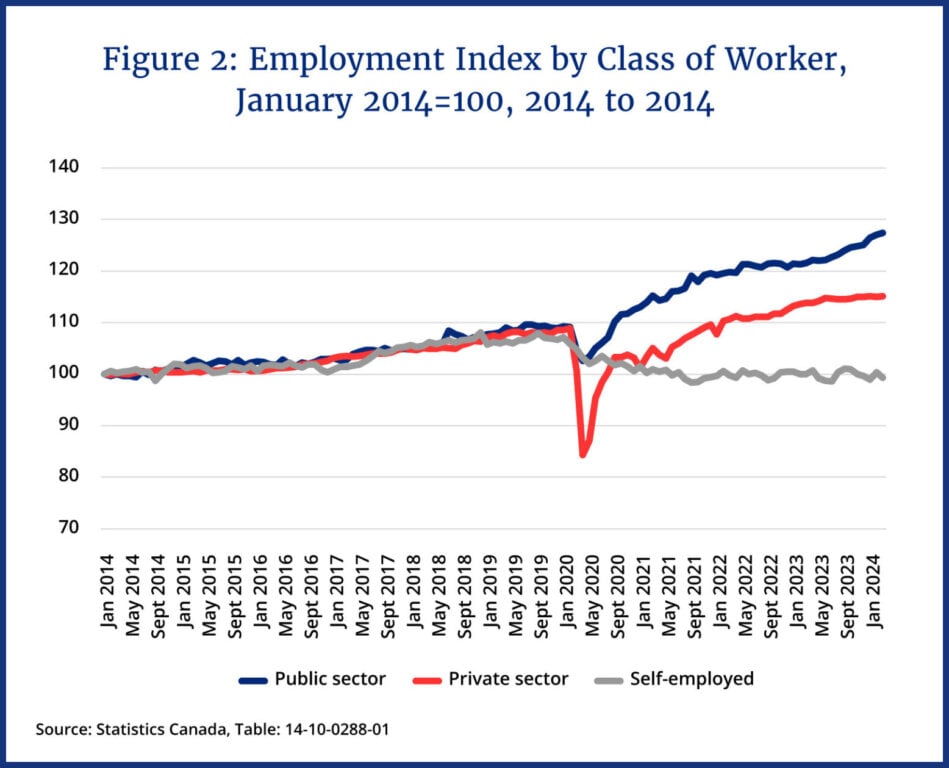This past fall, I saw the “Alberta is Calling” advertisements just about everywhere in Toronto, where I live—inside the subway station, on social media and even on a billboard. One ad was so cheeky that I laughed out loud. The poster read: “What does the Albertan say to the Torontonian? You’re hired.”
The campaign has now moved on to its next phase, targeting residents in the eastern provinces and other parts of Ontario, but did the ads work? I can’t say for sure, but I know of half a dozen people in my social circles who have packed up and moved out west in the last year. I don’t blame them—the subway ads really had me thinking, too.
I moved to the big city in 2021 to study journalism. Before that, I was living with my parents north of the Greater Toronto Area (GTA), working remotely in a corporate job and saving up for almost a year. Even with my savings and part-time job income, I struggled to afford my monthly rent, groceries and other necessities as inflation soared. I have a full-time job now, but thinking about the long term, I wasn’t sure I would ever be able to afford to buy my own home here—at the end of 2022, the benchmark price for a home in Toronto was just over $1 million.
Statistics Canada estimates that 29,422 people moved from Ontario to Alberta in 2021/2022—more than to anywhere else in the country. This is a 132% year-over-year increase. It’s not just Ontarians moving there. Approximately 28,238 British Columbians moved to Alberta over the same period—a 105% year-over-year increase and a 20-year record high for B.C.
Should you consider moving to Alberta? Before you start browsing real estate listings in the Princess Province, you’ve a lot to think about. I spoke to two experts—a realtor and a financial advisor—about how to weigh your options. I also talked to two Canadians who moved to Alberta (one from the GTA and one from British Columbia) to learn about their experiences, how they’re doing now and whether they have any regrets.
Why move to Alberta?
Moving to Alberta might help you stretch your money a bit farther, as mechanical engineer Emily Martin and her partner found out. (Name has been changed by request.) They moved from Vaughan, a city just north of Toronto, to Calgary in September 2022. The biggest reasons for the move were the lower cost of living, more affordable housing and the draw of the active lifestyle in Alberta, Martin says.
Housing costs in Alberta
In Calgary, Martin’s housing costs, including utilities, are $600 cheaper per month ($7,200 less per year) than what she was paying in the GTA. She lives in a 1,400-square-foot, multi-level unit in a house, paying $2,100 per month, including utilities, internet and parking. Her condo in Vaughan was 800 square feet and cost $2,300 per month plus around $400 for utilities, internet and parking ($2,700 total).
“We are saving around $600 a month and have nearly doubled the size of our living area,” Martin says. She adds that Calgary has “lots of options, especially downtown, in terms of apartments, condos, basement units, houses and townhouses to rent.”
Martin says she and her partner plan to buy a home in the next two years. “We knew if we stayed in the GTA, we wouldn’t be able to come up with a down payment. It would probably take us like 10 years,” Martin says. “At the time, we were both mechanical engineers and made more than the Canadian average salary. But it’s still not enough to pull that off.” (The Canadian average annual salary in 2021 was $54,000.)
The couple is working with a realtor in Calgary, and Martin says their home search has been a “great experience” so far. They’re looking for a three- or four-bedroom house in a central location, near public transit and the downtown core. “There are a lot of options between $400,000 and $600,000—whereas in Toronto, prices were around $1 million to $1.5 million, for what we were looking for,” Martin says.
Finding affordable housing was also a strong motivator for chiropractor and business owner Kendyl Muz. She and her family moved from Coquitlam, B.C., to the town of Stony Plain, Alta. (about a 25-minute drive from Edmonton) in August 2022 when they started to outgrow their three-bedroom home. Muz says the third bedroom in their Coquitlam townhouse was quite small, and they were considering having a third child.
“We started looking at bigger places in our area, in Coquitlam,” says Muz. “Everything was just insanely expensive, like $1.5 million and up.” So, she looked beyond B.C. to Alberta, where she found the prices to be more reasonable. She also had friends and family already living in the province, which helped to make the move easier.
Muz and her partner paid $600,000 for a single-family detached home in Stony Plain, where they are now living and working. The three bedrooms are much larger than those in their B.C. home, and the couple have the option of adding a fourth bedroom in the unfinished basement. Currently, the home’s livable space is 2,200 square feet—800 more than their B.C. townhouse—and the property includes a backyard, a three-car garage and a “bonus” room, which the couple converted into a playroom.
How do Alberta prices stack up against other Canadian cities?
Here’s a comparison of average home prices in major real estate markets across the country, as of April 2023:
| Property type | Toronto | Hamilton | Calgary | Edmonton | Vancouver | Halifax |
| Detached | $1,787,752 | $1,403,863 | $661,900 | $500,635 | $1,915,800 | $626,199 |
| Semi-detached | $1,326,462 | $1,024,342 | $593,200 | $378,797 | $1,078,400 | $437,892 |
| Townhouse/row | $1,053,864 | $967,229 | $387,400 | $261,390 | $1,078,400 | $536,570 |
| Condo | $751,916 | $666,987 | $299,400 | $192,560 | $752,300 | $484,491 |
Sources: Toronto Regional Real Estate Board, Calgary Real Estate Board, Realtors Association of Edmonton, Real Estate Board of Greater Vancouver, Nova Scotia Association of Realtors
Read more about Calgary and Edmonton in our Where to Buy Real Estate in Canada guide for 2023.
Alberta’s cost of living compared to other regions
Housing affordability isn’t the only financial incentive to relocate to Alberta. You may have heard the taxes are lower in the province, too.
Teresa Black Hughes, Certified Financial Planner at RGF Integrated Wealth Management in Vancouver, says that Alberta offers an advantage for residents, given that the province does not have a provincial sales tax or land transfer tax on the sale of a property. However, you will be charged a property registration fee—which is a $50 base plus $2 for every $5,000 portion of the property value, plus the fee on your mortgage: $50 and $1.50 for every $5,000. On a $500,000 property with a 20% down payment, this would cost $330 (compared to $12,950 in land transfer tax in Toronto for the same property price, for example). Alberta’s provincial website also states that the province does not apply a health premium tax (which the Ontario government says costs $0 to $900, depending on your income).
What about everyday expenses, like gas and groceries? As of late May 2023, the average cost of gas in Alberta is $1.40 per litre, which amounts to $77 for a full tank (55 litres on average). At current average fuel prices, a full tank of gas costs approximately $85 in Ontario and $100 in B.C. If you fill up your tank once every two weeks, for example, gas would cost you $1,848 per year in Alberta, $2,040 in Ontario and $2,400 in B.C.
The average yearly cost of car insurance in Alberta is $1,306 (versus $1,505 in Ontario and $1,832 in B.C.). As for groceries, the Alberta government estimates that the food cost per person is $250 per month, or $3,000 per year. That’s lower than the national average—in 2022, the average annual food cost in Canada was around $3,500 for women and $4,000 for men.
How much is income tax in Alberta?
You may pay a bit more income tax in Alberta than you would in other provinces. Black Hughes says that personal income tax rates in Alberta are slightly higher than in British Columbia and Ontario, but the difference in total income tax paid is small. You can use an income tax calculator to estimate your total tax payable. Read more about income tax brackets in different provinces.
The median after-tax annual income in Alberta in 2021 was $77,000. The median annual income was $73,000 in Ontario and $68,500 in B.C. Overall, Alberta offers lower housing and other costs when compared to other more populous provinces like Ontario and B.C., plus higher average incomes—although this is slightly offset by higher income tax rates in Alberta.
What’s it like to live in Alberta?
Alberta offers access to nature and other attractions near major cities. However, there is less transportation infrastructure in major cities in the province, compared to Toronto or Vancouver.
“It’s a very active young city,” Martin says about living in Calgary. “We’re both a lot healthier here—mentally and physically, which is another big thing.” Having access to the mountains, nearby fitness studios and walking trails have all contributed to her improved quality of life, she says.
If you are active and looking to spend more time outdoors, this is a major perk to consider. Keep in mind, though, that public transportation in Calgary is mostly limited to the downtown core, says Martin. She and her partner both had cars prior to moving to Alberta, and they still use them. Martin says that gas is usually cheaper in her new province, but she doesn’t notice a drastic difference. (See more about gas prices above.)
Edmonton, Alberta’s capital and second-largest city, aims to become a “15-minute city,” meaning that 50% of trips could be completed by public transportation or walking, but the plans are still in the works. Edmonton currently has a Walk Score of 40 (out of 100) and a Transit Score of 78. Calgary has a Walk Score of 39 and a Transit Score of 50. (A Walk Score of 0 to 49 indicates that a city is “car-dependent,” meaning most errands require access to a car, according to data aggregator company Walk Score. A Transit Score of 50 to 69 indicates that a city has many transit options, whereas a score of 70 to 89 indicates that transit is “convenient for most trips.”) Read more about the top neighbourhoods in Edmonton and Calgary.
Muz says the lifestyle change that came with moving to Alberta has been a plus for her family. “The bigger draw for us is to be able to have more of that family time, rather than working so hard to pay off a $5,000-per-month mortgage in B.C.,” she says of her family’s decision to move. “Anytime we come back to B.C. now, we’re like, oh man, we forgot how busy it is here and everyone just seems so stressed out and go go go.”
Muz mentions that another perk of living in Alberta is the shorter commute time. On the B.C. mainland, she dealt with endless traffic jams, and now her morning drive to work is all of seven minutes.
What’s the weather like in Alberta?
Another thing to think about is the weather. Alberta experiences “extreme cold temperatures during the winter, when temperatures can reach as low as minus 40°C or colder,” according to the provincial government. While many Canadians are no stranger to the cold, this is certainly something to consider, as it means increased heating costs and other factors, especially compared to British Columbia’s more temperate climate (in particular, the coastal areas), Black Hughes says.
The Alberta real estate market
I asked Spencer Tonkinson, realtor at Western Elite Real Estate Group in Calgary, what people moving to Alberta can expect during their search for housing right now.
“Right now, we’re getting a lot of people moving east, from B.C. to Alberta, which is very new to us,” Tonkinson says.
That added demand is increasing competition in the Calgary real estate market, given that many Ontarians also want to move west.
Why the growing interest from B.C.? Tonkinson says that, anecdotally, buyers are drawn to Alberta’s lower cost of living and ample employment opportunities. Some B.C. home owners have told him they’ve had difficulty keeping up with their mortgage payments as interest rates climbed, and they noticed that home prices in Alberta are more affordable.
“Certainly competition, I think, is going to get worse,” Tonkinson says. The spring market was tight, with fewer sellers than expected for all types of homes, and the lower inventory could mean higher competition, he says. Already, some prospective buyers are being pushed into the rental market because higher interest rates have made it harder to qualify for a mortgage. Tonkinson says this has contributed to pushing up rent prices in the Calgary area.
Even with growing competition, Tonkinson says, one major difference between the Alberta market and other areas of Canada is that it’s less common to see well-above-list-price sales, unconditional offers or bully offers (made before the offer presentation date), as seen in hot markets like Toronto.
Are moving expenses tax-deductible in Canada?
Before you pack any boxes to move to Alberta, find out how much it would cost to get there. You can use the CAA’s gas price calculator to estimate the cost of gas for your trip, if you are driving, or find out the price of a one-way flight. Consider also whether you would sell your furniture and other possessions and buy new ones when you arrive, or pay for a moving truck to have them transported to Alberta. Check some moving truck quotes at U-Haul or Budget—estimates vary, but you can expect to pay $2,000 or more for a long trip.
Keep in mind that you can get a tax refund for these expenses in certain cases. “Moving expenses may be deductible if you have moved and established a new home to work or run a business,” Black Hughes says.
The Government of Canada lists some costs that are eligible for deduction on your income tax return, such as transportation and storage costs, travel expenses and temporary living expenses. For more on filing income taxes, check out our income tax guide.
So, all things considered, should you move to Alberta?
Moving to another province is a life-changing decision—and only you can weigh the pros and cons for your situation. Research is key, and that could include doing a trial run.
“You have to first visualize yourself there and do the homework, to get a sense of what the community and the environment are going to be like,” Black Hughes says. “Maybe you can rent in that area for a while to get the feel of it and see if it’s someplace you see yourself moving to permanently.”
She cautions that if you sell your home or give up your apartment and then decide you don’t like your new setup, it can be very expensive and difficult to move back. Also, consider whether you will need to find a new job, or if your employer would be comfortable with you working remotely (and possibly in a different time zone). Black Hughes says to also consider health care costs and how your access to care could change in a new location, based on your individual circumstances and needs.
Alberta is calling…but think hard before you answer. While the move could pay off financially, there are lifestyle and other factors to consider.
Read more about real estate:
- Where to Buy Real Estate in Canada 2023: National ranking
- How to take advantage of the first home savings account
- Where to Buy Real Estate in Canada 2023: Calgary
- The best 5-year fixed mortgage rates in Canada
The post Should you move to Alberta? appeared first on MoneySense.






